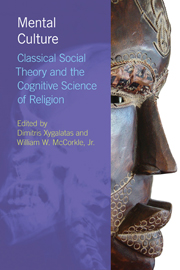Book contents
- Frontmatter
- Contents
- List of illustrations
- Contributors
- 1 Introduction: social minds, mental cultures – weaving together cognition and culture in the study of religion
- 2 Explanatory pluralism and the cognitive science of religion: why scholars in religious studies should stop worrying about reductionism
- 3 Early cognitive theorists of religion: Robin Horton and his predecessors
- 4 The opium or the aphrodisiac of the people? Darwinizing Marx on religion
- 5 Immortality, creation and regulation: updating Durkheim's theory of the sacred
- 6 Non-ordinary powers: charisma, special affordances and the study of religion
- 7 Malinowski's magic and Skinner's superstition: reconciling explanations of magical practices
- 8 Towards an evolutionary cognitive science of mental cultures: lessons from Freud
- 9 Piaget on moral judgement: towards a reconciliation with nativist and sociocultural approaches
- 10 Building on William James: the role of learning in religious experience
- 11 Explaining religious concepts: Lévi-Strauss the brilliant and problematic ancestor
- 12 The meaningful brain: Clifford Geertz and the cognitive science of culture
- 13 Cognitive science and religious thought: the case of psychological interiority in the Analects
- 14 Conclusion: moving towards a new science of religion; or have we already arrived?
- Bibliography
- Index
3 - Early cognitive theorists of religion: Robin Horton and his predecessors
- Frontmatter
- Contents
- List of illustrations
- Contributors
- 1 Introduction: social minds, mental cultures – weaving together cognition and culture in the study of religion
- 2 Explanatory pluralism and the cognitive science of religion: why scholars in religious studies should stop worrying about reductionism
- 3 Early cognitive theorists of religion: Robin Horton and his predecessors
- 4 The opium or the aphrodisiac of the people? Darwinizing Marx on religion
- 5 Immortality, creation and regulation: updating Durkheim's theory of the sacred
- 6 Non-ordinary powers: charisma, special affordances and the study of religion
- 7 Malinowski's magic and Skinner's superstition: reconciling explanations of magical practices
- 8 Towards an evolutionary cognitive science of mental cultures: lessons from Freud
- 9 Piaget on moral judgement: towards a reconciliation with nativist and sociocultural approaches
- 10 Building on William James: the role of learning in religious experience
- 11 Explaining religious concepts: Lévi-Strauss the brilliant and problematic ancestor
- 12 The meaningful brain: Clifford Geertz and the cognitive science of culture
- 13 Cognitive science and religious thought: the case of psychological interiority in the Analects
- 14 Conclusion: moving towards a new science of religion; or have we already arrived?
- Bibliography
- Index
Summary
The cognitive science of religion is, on most accounts, only twenty or thirty years old. Its philosophical origins, however, lie at least four centuries back, and its ethnographic origins at least half a century. Its central claims include three made by philosophers, early on. First, religion may best be understood as a result of features intrinsic in human cognition and its epistemic context. Second, these intrinsic features include certain systematic interpretive biases. These may lead us, most importantly, to see the world as more human-like (or “agent-like”) than it is. A third tenet, now usually implicit, is that religious thought and action are not sui generis but are continuous with secular thought and action.
The strongest early cognitivism regarding religion is that of two philosophers and an anthropologist: Benedict de Spinoza, David Hume and Robin Horton. They claim that religion may be understood not just as an outcome of certain cognitive features, but as itself primarily a cognitive endeavour. It is, in the first instance, an attempt neither to console ourselves (Freud) nor to form social bonds (Durkheim), although its constructs may be so used. Rather, it is an endeavour to interpret and influence the world.
The claim that religion stems from intrinsic cognitive processes originally was largely introspective (as was Kant's assertion that time and space are intrinsic in cognition; De Smedt & De Cruz 2011) but in the twentieth century acquired scientific elaboration.
- Type
- Chapter
- Information
- Mental CultureClassical Social Theory and the Cognitive Science of Religion, pp. 33 - 51Publisher: Acumen PublishingPrint publication year: 2013



